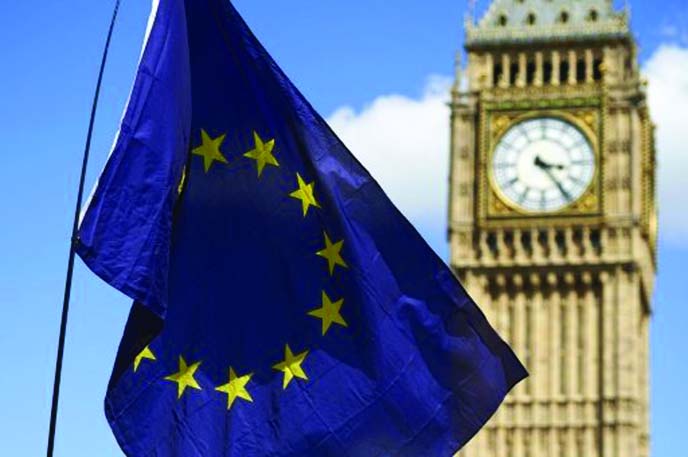
AFP, Frankfurt :
Britain’s vote to leave the European Union will weigh on the outlook for growth in the euro area next year and the year after, a European Central Bank survey showed on Friday.
According to the ECB’s regular quarterly survey of professional forecasters, eurozone growth is expected to average 1.6 percent this year, unchanged from an earlier prognosis.
But growth will then slow to 1.4 percent in 2017 and pick up only modestly to 1.6 percent again in 2018.
In a previous survey in April, forecasters had been pencilling in a growth rate of 1.6 percent for next year and 1.7 percent for the year after.
“Based on the qualitative comments provided by the respondents, these revisions largely reflect an expected negative impact on the euro area from the UK referendum result,” the ECB wrote.
In a seismic vote on June 23, 52 percent of Britons voted in favour of a so-called “Brexit”, despite widespread warnings of dire economic consequences.
While financial markets appear to have stabilised from the initial shock, forecasters are concerned that the full impact will begin to make itself soon.
Turning to the inflation outlook for the 19 countries that share the euro, the survey saw a slight downward reduction in experts’ inflation forecasts.
Consumer prices in the euro area were projected to increase by an annual average 0.3 percent this year and then pick up by 1.2 percent in 2017 and 1.5 percent in 2018.
Compared with the previous survey, that represented a slight downward revision of 0.1 percentage point for both next year and the year after.
The ECB, which regards an inflation rate of close to but just under 2.0 percent as conducive to healthy economic growth, has rolled out a series of measures in recent years to drive up the single currency bloc’s chronically low inflation rate.
At a policy meeting on Thursday, the central bank kept its key interest rates at their current all-time lows.
The ECB Survey of Professional Forecasters (SPF) collects the views of experts affiliated with financial or non-financial institutions based within the European Union.
While the ECB insists that the survey results do not represent the views of its staff and decision-making bodies, the SPF survey usually provides an indication of where the ECB’s own forecasts-scheduled for release on September 8 — are headed.
The latest survey was conducted between June 30 and July 6, after the Brexit referendum, and there were 51 respondents, the ECB said.
Britain’s vote to leave the European Union will weigh on the outlook for growth in the euro area next year and the year after, a European Central Bank survey showed on Friday.
According to the ECB’s regular quarterly survey of professional forecasters, eurozone growth is expected to average 1.6 percent this year, unchanged from an earlier prognosis.
But growth will then slow to 1.4 percent in 2017 and pick up only modestly to 1.6 percent again in 2018.
In a previous survey in April, forecasters had been pencilling in a growth rate of 1.6 percent for next year and 1.7 percent for the year after.
“Based on the qualitative comments provided by the respondents, these revisions largely reflect an expected negative impact on the euro area from the UK referendum result,” the ECB wrote.
In a seismic vote on June 23, 52 percent of Britons voted in favour of a so-called “Brexit”, despite widespread warnings of dire economic consequences.
While financial markets appear to have stabilised from the initial shock, forecasters are concerned that the full impact will begin to make itself soon.
Turning to the inflation outlook for the 19 countries that share the euro, the survey saw a slight downward reduction in experts’ inflation forecasts.
Consumer prices in the euro area were projected to increase by an annual average 0.3 percent this year and then pick up by 1.2 percent in 2017 and 1.5 percent in 2018.
Compared with the previous survey, that represented a slight downward revision of 0.1 percentage point for both next year and the year after.
The ECB, which regards an inflation rate of close to but just under 2.0 percent as conducive to healthy economic growth, has rolled out a series of measures in recent years to drive up the single currency bloc’s chronically low inflation rate.
At a policy meeting on Thursday, the central bank kept its key interest rates at their current all-time lows.
The ECB Survey of Professional Forecasters (SPF) collects the views of experts affiliated with financial or non-financial institutions based within the European Union.
While the ECB insists that the survey results do not represent the views of its staff and decision-making bodies, the SPF survey usually provides an indication of where the ECB’s own forecasts-scheduled for release on September 8 — are headed.
The latest survey was conducted between June 30 and July 6, after the Brexit referendum, and there were 51 respondents, the ECB said.

